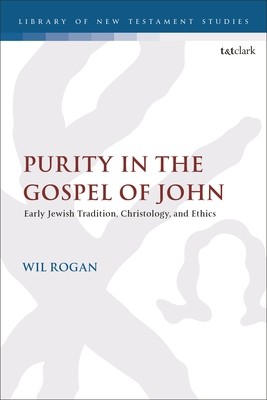
- We will send in 10–14 business days.
- SAVE -10% with code: EXTRA
Reviews
Description
Wil Rogan argues that, contrary to 20th century interpretation, the Fourth Gospel did not replace purity with faith in Jesus; instead, like other early Jewish writings, it employs conceptions and practices of purification as a way to make sense of life before God in the world. He suggests that the gospel uses biblical traditions of purity associated with divine revelation and Israel's restoration, in order to narrate how God's people are prepared for the coming of Jesus and enabled by him to have life with God.
After evaluating different theories of purity for the interpretation of the Fourth Gospel, Rogan explores John the Baptist as an agent of ritual purification, Jesus as the agent of moral purification, and the disciples of Jesus as ones who are (or are not) made morally pure by Jesus. While purity is not one of the Fourth Gospel's primary focuses, Rogan stresses that the concept figures into some of its most significant claims about Christology, the doctrine of salvation, and ethics; purity is one of the ways that the gospel guards continuity with the past while placing surprising conditions on participating in Israel's future.EXTRA 10 % discount with code: EXTRA
The promotion ends in 23d.12:49:52
The discount code is valid when purchasing from 10 €. Discounts do not stack.
- Author: Wil Rogan
- Publisher: T&T Clark
- ISBN-10: 0567708667
- ISBN-13: 9780567708663
- Format: 15.6 x 23.4 x 1.3 cm, kieti viršeliai
- Language: English English
Wil Rogan argues that, contrary to 20th century interpretation, the Fourth Gospel did not replace purity with faith in Jesus; instead, like other early Jewish writings, it employs conceptions and practices of purification as a way to make sense of life before God in the world. He suggests that the gospel uses biblical traditions of purity associated with divine revelation and Israel's restoration, in order to narrate how God's people are prepared for the coming of Jesus and enabled by him to have life with God.
After evaluating different theories of purity for the interpretation of the Fourth Gospel, Rogan explores John the Baptist as an agent of ritual purification, Jesus as the agent of moral purification, and the disciples of Jesus as ones who are (or are not) made morally pure by Jesus. While purity is not one of the Fourth Gospel's primary focuses, Rogan stresses that the concept figures into some of its most significant claims about Christology, the doctrine of salvation, and ethics; purity is one of the ways that the gospel guards continuity with the past while placing surprising conditions on participating in Israel's future.

Reviews